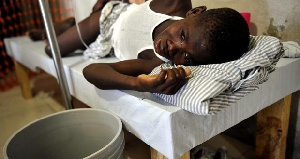Ghana placed second in the 2014 Cholera ranking in West Africa, a Communication Consultant for United Nations International Children's Emergency Fund (UNICEF), Mr Emmanuel Addai has said.
With 28,944 cases and 247 deaths, Ghana followed Nigeria which took the lead with 35,946 cases and 755 deaths; while with two cases and no death, Guinea Conakry was at the bottom of the ranking.
Mr Addai said this during a media training workshop held on theme: "Menace of Open Defecation (OD)", organised by UNICEF and the Environmental Health Services Department of the Ministry of Local Government and Rural Development (MLGRD) in Cape Coast.
He said the country's OD rate had reduced from 22 percent in 1990 to 19 percent in 2015, and described the reduction, after 25 years, as worrying since the Millennium Development Goal target on OD was 11 percent.
He said in the Ghana Statistical Service 2011 report, the Central Region was ranked fifth in OD ranking with 14.8 percent rate as against the national average of 19 percent.
The workshop, attended by about 20 media practitioners from across the region, was aimed at building the capacity of participants.
Held in line with World Toilet Day marked on November 19, the workshop was also to help community radio stations to create awareness on issues of open defecation in their communities.
As part of efforts to ensure proper sanitation in the country, the UNICEF is supporting the MLGRD to implement an OD Free initiative dubbed Community-led Total Sanitation (CLTSO), in the Central Northern, Volta, Upper East and West Regions and Ashaiman in the Greater Accra Region.
In the Central Region, the initiative is running in five districts including Abura- Asebu-Kwamankese, Gomoa East, Ajumako-Enyan-Essiam, Assin South and Asikuma-Odoben-Brakwa.
Some of the challenges with the CLTS, Mr Addai said included limited Government funding, stakeholder apathy, environmental factors, political interference and lack of political will to enforce sanitation bye laws.
Mr Martin Amevor, the Regional Environmental Health Service Officer, said less than five communities in the whole Central Region were OD free adding that the practice was one of the key sanitation problems in the region.
He said efforts to enforce the sanitation bye laws especially on the prosecution of sanitation offenders was being hindered by political interference, citing an instance where a District Chief Executive paid court fines for 10 convicted sanitation offenders.
Despite the challenges, he said efforts such as the Open Defecation free initiatives and other sanitation related programmes were being implemented in the region.
Mrs Ama Kudom-Agyemang , UNICEF Water and Sanitation Health consultant, urged them investigate well and write compelling environmental stories to help change the current status quo.
The CLTS focuses on a change from the open defecation as a norm to the use of toilets as a new norm; the concept also stresses on behavior change rather than the provision of latrines and frowns on communal latrines as a solution.
Health News of Wednesday, 25 November 2015
Source: GNA

















